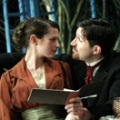Sally Edwards relaxes after the matinee of the latest production from the Oxford Stage Company, August Strindberg's Easter. Set over the Easter weekend at Lund in Sweden in 1901, Easter is the story of the Heyst family's attempt to rise above the apparently insurmountable problems of life. With Mr Heyst imprisoned for embezzlement and young Eleanora Heyst committed to an asylum, Mrs Heyst and her son Elis live a life of anxiety and fear. At any moment their lives may collapse under the strain of imminent ruin. At any moment their fragile existence may be shattered for good. Easter is not a play of hopelessness, however, but an unusual drama of hope, joy, mercy and salvation.

Edwards is on tour with Easter until it arrives at the Riverside Studios. The production may have joy and hope, but Edwards admits it is also intellectually challenging both for the actor and the audience: "Just when you think you've got ahead of the plot it shifts -- but it does have a happy ending." "It's obvious Strindberg really likes his characters -- the whole thing is set in one drawing room over Maundy Thursday, Good Friday and Easter Saturday -- when the family's fortunes come to a climax."
The play is certainly different from traditional Strindberg drama which is famous for its dark sexuality and Scandinavian nihilism; this is a play with passion and humour, where "moments of inconsequentiality are given such meaning and weight on stage." Edwards plays Mrs Heyst, who struggles between despair and guilt, and a stubborn refusal to believe in her husband's all too obvious guilt. It is left to her schoolteacher son, Elis , to steer the remnants of the family through this deeply important weekend of resolution and personal enlightenment.
"A religious motif runs throughout the play" says Edwards, "where the suffering for other's sins impacts on this family's attempts at individual resurrection." Edwards describes the moment when the escaped daughter arrives bearing a single daffodil -- a symbol of hope. How far Strindberg was demonstrating his own religious fervour is hard to determine. "A Swedish woman came to the play and said she recognized the anxiety, the guilt and the need for atonement." Strindberg had suffered a nervous breakdown before writing Easter, a nervous breakdown that seems to have mellowed his personal view of faith -- whether Lutheran of Catholic.
The rehearsal process under the direction of Dominic Dromgoole followed a pattern which Edwards says had been successfully laid over previous productions. "Dominic lets us spend the first week of a four week rehearsal and one week tech sitting around a table studying the text line by line -- it is this meticulous care for the text that gives the actor the freedom to discover for themselves where to place the line." Only after this careful initial process are the actors able to "get on our feet -- the ideas that have been shaped in our heads can be blocked and staged."
Edwards stresses how Dromgoole is passionate to find the "tone of the piece." It is this 'tone' that adds the dimension of realism to a one hundred year old play. "We have to find the tone of a Swedish formality; we are so used to the naturalism of soaps -- to a modernness -- that we have to guard against that in performance." "It's a process of striking a balance between underlying emotion, tension and anxiety, and ensuring these all don't come out in a great gush." Dromgoole is obviously a director well-suited to "steering the course through this del icate play."
One of Dromgoole's rehearsal techniques is to ask the actors to "perform a scene in which they each love one person, or each hate one person; or it may be set in a kitchen, or the hottest time of the day, or they all have the hots for each other." "This is so liberating for the actor -- we see new layers; OK, we can't use these moments in the play, often they are so funny -- but it gives new insights into a character that we'd nev er see otherwise, new complexities."
Edwards is describing a director who understands his actors and actively helps them to discover the 'inconsequentialities' of each character. His directorial style is perfectly suited for a play which is separated not only by a century of time but by an entire culture. Dromgoole's approach of "searching for the beast of the play" has certainly paid off with Easter . "People are constantly telling us how they have left the theatre excited and uplifted -- they want to go home and talk and talk about it." That is certainly the sign of a moving and enlightening production.
"The play is about our desires and frustrations, about big and small problems and struggling against life -- it's both relevant and magical and very, very funny." Sally Edwards is passionate about Easter and her passion is infectious. It seems that, yet again, the Oxford Stage Company have found a play which is perfectly suited to our age and perfectly suited to our psyche. Passion, excitement, hope and humour -- what more could you want for an evening's entertainment?
Kevin Quarmby © 2005
|
